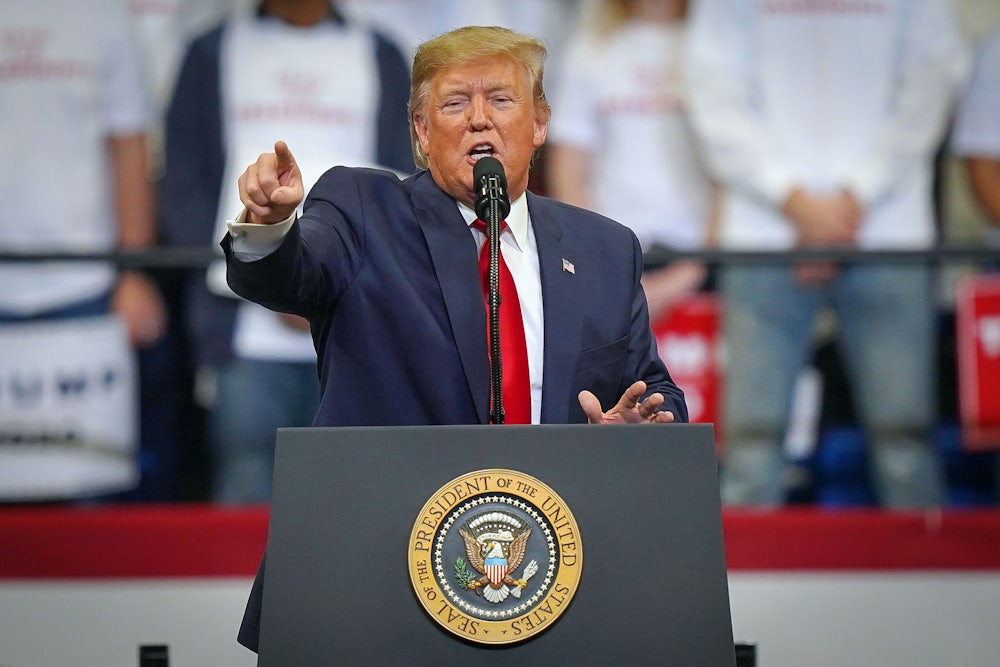On Monday, President Donald Trump and Secretary of State Mike Pompeo formally notified the international community of the United States’ planned withdrawal from the Paris climate agreement in 2020.
To date, America is the only country to move to withdraw from the landmark 2015 agreement. Trump boasted his intention to do so on the 2016 campaign trail, but due to the restrictions set during the ratification of the agreement, he was forced to wait three years before formally informing the United Nations, kicking off a yearlong removal process. The move has already been decried by over two dozen governors, making up what has been termed the U.S. Climate Alliance. On Monday, they released a statement pledging to continue to uphold the agreements through the powers they wield at the state level—an act of defiance, but with the full knowledge that to avert this crisis, two dozen governors will not be enough, nor would fifty governors and 573 tribal nations: To make any good-faith effort to protect those residing within its borders, the U.S. would have to be doing its utmost to uphold the terms of the Paris Agreement, including encouraging others to do the same. Instead, Trumpists have sought to brand the withdrawal as a patriotic act worthy of adulation, rather than the near-universal admonishment it’s been met with in the last 24 hours.
As made plain by an article published on Tuesday in Bioscience declaring a climate emergency, time is running out. Building off the Intergovernmental Panel on Climate Change report released last year, over 11,000 scientists joined together to shout what anyone who’s dared to look at the actual numbers must already know: Without dropping the federal government’s current route in favor of drastic, immediate action, America and the rest of the world are staring at a global catastrophe that they are presently ill-equipped to handle.
The original goal of the Paris Agreement was specific in focus—keep the global temperature from rising more than two degrees Celsius above pre-industrial levels—but broad in its explanation of how the 200-plus countries could accomplish that goal. This led to the criticism that the agreement had actually not gone far enough in demanding governments actually consider and legislate as though they have a crisis on their hands. There were no legal ramifications baked into the agreement to incentivize or penalize countries for violating their established greenhouse gas emissions goals—goals that were set by the individual countries themselves.
Three years out from the agreement, and three years into the Trump presidency, America ranks among the worst countries on Earth for actual progress on the rejiggering of its national energy production and usage to slow global warming. Federal agencies continue to sell off land to be mined and fracked and drilled by oil and gas and coal companies, while shutting out and smothering the critical science-based studies and reports that would otherwise point their bosses in the opposite direction. The president has been nothing if not consistent in his determination to ram through unpopular and unnecessary gas pipelines. And the courts, while acting as a brief buffer, continue their conservative curve toward a future where deregulation reigns supreme. As a result, the nation is barreling toward a future where global temperatures rise three degrees Celsius come 2100.
There are consequences for all of these actions, but those consequences are rarely felt by those pulling the strings. Biodiversity is decreasing at an alarming rate, raising the the threat of an “extinction crisis.” The oceans are rising, both in terms of sea level and temperature. And the natural wonders both on land and in the water are rapidly decaying. Native nations in the Midwest are being flooded and left by state forces to fend for themselves; fishers across the country—from the Northeast to all along the Mississippi River and out along the Gulf—are being put out of business due to polluted and warming waterways. Farming is becoming harder and harder—particularly for the dwindling population of small farmers. The poorest citizens in low-sitting cities like New Orleans and Miami have, maybe, another couple of decades before they’ll be forced to relocate. Meanwhile, the closest the wealthy have come to being truly harmed by the volatile effects of climate change is when a celebrity has been forced to live-tweet their departure from a hillside mansion in California to a nearby five-star hotel as forest fires inch closer.
The move to withdraw from the Paris Agreement is just one of dozens in a long line of decisions made by Trump that falls in line with what has become his most defining trait: his supposed commitment to placing “America first,” striking back against some imagined international gang of foreign powers, which through the Paris Agreement, was purportedly strong-arming the most powerful and dominant imperial power in the world into helping itself and its citizenry.
It’s a narrative which with each passing day requires more effortful delusion to maintain. Withdrawing from the Paris Agreement does not put America first: There’s no question, at this point, that millions of Americans will suffer for their government’s climate denial—among them the wealthy; the poor, marginalized communities used to governmental apathy; and the Trump voters currently lapping up his climate-denial. The questions, instead, are how we fix it, what it will take to get politicians to care, and how much time we even have to convince them.
